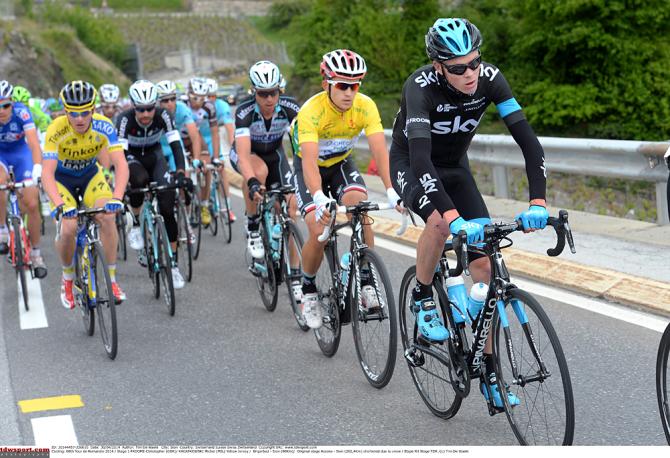Team Sky: No medicine for regret
Shades of grey between MPCC’s ethical code and Team Sky’s TUE for Chris Froome



Where does the line between performance medication end and performance enhancement begin? And secondly, what’s more important: the letter of the law or the ethics behind it?
They are questions that cycling teams face whenever medical practices are brought into question and it is a debate that has thrown the defending Tour de France champion, Chris Froome, into the public eye with legitimate questions raised over Team Sky’s anti-doping stance, the policy of the UCI’s handling of Therapeutic Use Exemption (TUE) process and the grey area between Movement For Credible Cycling (MPCC) teams and the rest of the field.
As has been reported, Froome and the medical staff at Team Sky applied for a TUE at the Tour of Romandie due to the rider carrying a chest infection that had ruled him out of Liege-Bastogne-Liege. The UCI were willing to fast-track the application in time for the British rider to race and he went onto win the event for the second consecutive season.
The substance involved was Prednisone, a glucocorticosteroid, a derivative of cortisol. According the Sunday Times, Froome had used the substance in 2013 for a similar health issue.
Anko Boelens is the Dutch team doctor of Giant-Shimano. The team are one of the members of the MPCC, a body that Team Sky has opted not to join.
The MPCC is a collection of professional teams that look to improve the ethics and use of medical application within the sport. Like every element within the anti-doping world it’s not perfect but they are an important weapon in the fight against doping, and even WADA has taken on board their concerns over Xenon gas and banned the substance. The MPCC has also lobbied for a similar status to be handed to Tramadol and WADA has already added it to the watch list.
“Of course I’m not at Team Sky so I’ve not seen the TUE myself but from what I gather it’s a TUE for glucocorticosteroid and there are two issues at stake,” Boelens told Cyclingnews.
Get The Leadout Newsletter
The latest race content, interviews, features, reviews and expert buying guides, direct to your inbox!
“The first is when a drug is performance enhancing and when is it a medicine to make someone better. From what Sky have released to the media, Froome was ill at that moment and that he needed the glucocorticosteroid to get better and to keep on cycling. In that respect there’s nothing wrong. It all seems legitimate that they filed for a TUE and it was granted.
Eight-day rule
According to WADA’s rules the prescription of the substance may be granted if the therapeutic use of the substance would not produce significant enhancement of performance. Cortisone is not banned under MPCC rules but the administration of the drug comes with an unequivocal caveat – take cortisone if you need to but once it’s in your system you cannot race for an eight-day period.
“At the MPCC, glucocorticosteroid for us is actually a no go area. It’s not forbidden but what we say is that if you need it, then you’re sick and if you need glucocorticosteroid, you’re too sick to compete. Period."
“If you ask me whether it’s strange that he filed for the TUE, I’d say no and you’ll see that WADA and the UCI have said so too. However the MPCC think that a rider who needs cortisone isn’t fit to ride. That’s not a judgement on Sky it’s just that we go on things a little differently.”
As has been pointed out, Froome won the race, beating four athletes who are part of MPCC teams into second, third, fourth and fifth, and, as Boelens states, it’s not the use of cortisone products that is the issue but the scenario in which they’re used. The MPCC’s stance isn’t just born out of concerns for rider health but from the overlap between that and the ways in which TUEs and cortisone have been abused in the past.
“In the past, cortisone has been used in a negative way. For us that’s another reason not to mix riding racing and using cortisone. As for a performance enhancing drug, cortisone has been used for that in the past and it was given to riders in order to make them ride faster and recover quicker,” Boelens said.
Boelens refrained from voicing his personal opinion on the ethical standards involved. “From what I hear there was nothing sinister and it’s up to WADA and the UCI to validate each TUE on its own merit. If they say this TUE is okay then that’s the end of it,” he added.
“However we would have done things a bit different. For us no matter how sick you are if you need it, you don’t race. If you want to know how sick you can be and still win then you need to ask Team Sky. Ask them, so your rider needs cortisone and he wins, how sick can he be? For me I can’t answer that and I don’t want to suggest anything because I can’t judge.”
Two philosophies
There are two almost competing philosophies within professional cycling, with teams who follow the MPCC guidelines at a potential disadvantage when faced with teams which, although falling in line with the WADA code, compete to the letter of the law and not the MPCC’s ethical standards.
“Some people might feel like that and it might seem like we’re putting ourselves at a disadvantages. I don’t see it like that because I think it gives us clarity and it gives us clear boundaries to compete in sport. Also the systems in place by WADA are there to stop people abusing the system but in order to eliminate all doubt we as the MPCC have our rules. Of course we hope that more teams join us or that WADA do too but until that day someone has to start. If no one does it then it definitely won’t happen.
“As for two philosophies, that’s a legitimate question but one I think that you need to raise with Team Sky. It’s also a grey area. Sometimes people are not feeling well, they have a temperature, they’re coughing and are they fit to race? Sometimes it’s difficult but in this case you need to ask team Sky if it’s responsible to let someone ride if they need it. That’s a question I can’t answer. All I can say is that if we had someone who needed glucocorticosteroid to be in a race and to compete it wouldn’t have been an option. They wouldn’t have raced.”
Cyclingnews did contact Team Sky but were told that their medical staff were unavailable for interview. Instead we posed questions to them via email as precursor for a wider debate.
We asked how ill Frome had been before Romandie, why Sky has taken the stance of not joining the MPCC, and whether the team feels that there is a grey area or even two competing philosophies within the peloton when it comes to rider care and standards for issuing medication.
Regarding Chris Froome racing at Romandie, a spokesperson for the team stated: "It was safe for Chris to ride at Romandie and he was given the appropriate treatment. Our riders will only race or train when it's right to do so – their safety and long-term health are essential. The medical team supports all of our riders, in and out of competition, and provides the proper medical care to ensure they are always safe to ride."
On the subject of the MPCC, the team added: “Team Sky's approach to anti-doping is well-known. We abide by the rules and we strongly support the authorities – including the UCI and WADA – in their work. We’re happy with our position. The MPCC is a voluntary organisation and we – like some other teams – are not members of the group."
The third question wasn't answered. However Team Sky is right in that they’re not the only top level team to shy away from the MPCC.
Boelens, of course, would like to see parity with more teams joining the MPCC and WADA and the UCI picking up more of the movement’s recommendations.
“We still feel like we’re dealing with the past and we want to be open and clear, to take away all doubts. You can see what kind of media attention this has generated and glucocorticosteroid has been known as a performance enhancing drug that has been used a lot. We don’t want grey areas anymore so there are no glucocorticosteroids for our riders in races," he said.
“I’d like to see the MPCC rules for all the teams, definitely. That’s what we’re regularly asking the UCI and WADA. It’s working because Tramadol is under investigation and Xenon has been banned quickly by WADA. We hope Tramadol will be on the banned list in the future and we feel that glucocorticosteroid and riding races shouldn’t be combined. That’s important, that part. It’s about riding races.”
Daniel Benson was the Editor in Chief at Cyclingnews.com between 2008 and 2022. Based in the UK, he joined the Cyclingnews team in 2008 as the site's first UK-based Managing Editor. In that time, he reported on over a dozen editions of the Tour de France, several World Championships, the Tour Down Under, Spring Classics, and the London 2012 Olympic Games. With the help of the excellent editorial team, he ran the coverage on Cyclingnews and has interviewed leading figures in the sport including UCI Presidents and Tour de France winners.
